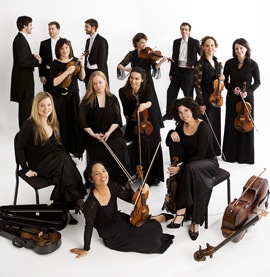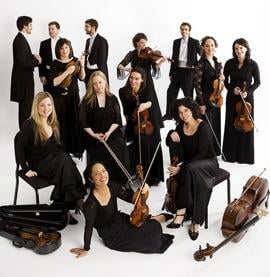
Castrati voices played such a significant role in Baroque opera, it’s tempting to think that 18th-century composers didn’t care much for tenors. In their excellent program Sunday afternoon for Cal Performances, Ian Bostridge and Les Violons du Roy quickly put that supposition to rest, offering a bracing reminder of the beauty and variety of Baroque tenor roles — and a tribute to three of the tenors who sang them.
The program featured arias and vocal excerpts from works by Handel, Vivaldi, Gasparini, and Caldara. As Bostridge explained, these composers wrote a range of stirring and dramatic vocal music for the celebrated 18th-century tenors Francesco Borosini, Annibale Fabri, and John Beard.
Sunday’s concert in Zellerbach Hall — the first of two programs Les Violons du Roy will perform there this week — marked a welcome return by the Quebecois chamber ensemble under Bernard Labadie. And, with its focus on vocal works for the tenor voice, it was a fine showcase for Bostridge. Singing in English and Italian, the British tenor brought a beguiling blend of musical intelligence, dramatic focus, and tonal sheen to each performance.
Related Articles
Tenor Ian Bostridge, in Love With the Song
An interview with the tenor
Stellar Singing by Ian Bostridge
Ian Bostridge's 2010 Cal Performances recital
The afternoon’s high point came in the second half’s set of arias composed by Vivaldi and Handel, all closely associated with Fabri. Bostridge delivered the first, “Saziero col mio morir” from Vivaldi’s opera Ipermestra, with clarity and eloquence. His has never been an outsized instrument, but in this music, it sounded plush and resonant, with no signs of strain. Next came “La tiranna” from the composer’s Arsilda. Here, with Labadie conducting a pulsing performance, Bostridge summoned urgent, anguished tone. The set ended with “D’un barbara scortese” from Handel’s Poro. Bostridge sang the brilliant aria (text by Metastasio) with incisive eloquence.
The other selections were often just as potent. In the first half, Bostridge contrasted a pair of arias, both titled “Forte e lieto,” from two operas named Tamerlano. The first, by Handel, was an exquisitely poised setting. The second, by Gasparini, was more emphatic, more heavily ornamented, yet not as affecting. “Lo so, con periglio,” from Caldara’s oratorio Joaz, was the afternoon’s rarity. The aria, composed for Borosini, deals with intrigue in the court of Athalia. Bostridge, who sang its long-breathed phrases with steely focus, noted that its theme of “speaking truth to power” is as relevant today as it was in Caldara’s time.
Turbulence and Sensual Beauty

Revelations aside, Handel’s music yielded the afternoon’s most brilliant performances. The first half closed with “Scorta siate a passi miei” from Handel’s Giulio Cesare, written for Borosini when he assumed the role of Sesto — previously a soprano role — in the opera’s 1725 revival. As Labadie whipped up a wealth of turbulent sound, Bostridge delved into the vocal part with forceful emphasis and an apt snarl. The composer’s “From Celestial Seats Descending” and “Where Congeal’d the Northern Streams” closed the program in an atmosphere of sensual beauty.
In between the vocal works, Labadie and his ensemble played instrumental music: in the first half, Handel’s Suite from Alcina, and the composer’s Concerto Grosso in F Major, Op. 3, No. 4; after intermission, Geminiani’s Concerto Grosso No. 12 in D Minor (after Corelli’s Violin Sonata in D Minor, Op. 5, No. 12, “La folia”) and William Boyce’s Symphony in B-flat Major, Op. 2, No. 1. Les Violons du Roy’s musicians play modern instruments, with a point of view that is both energized and historically informed, and Labadie’s command of this repertoire is nothing short of masterful; he shaped each performance with tenderness and vigor. (The ensemble returns to Zellerbach Hall on Tuesday, May 3, to play an all-Bach program with harpsichordist Alexander Weimann as soloist.)
Bostridge returned for two encores: a characterful excerpt from Francesco Conti’s Don Chisciotte, and “Softly Rise, O Southern Breeze” from Boyce’s Song of Solomon. In the latter, Les Violons du Roy’s Nadina Mackie Jackson supplied the lovely bassoon solo.

